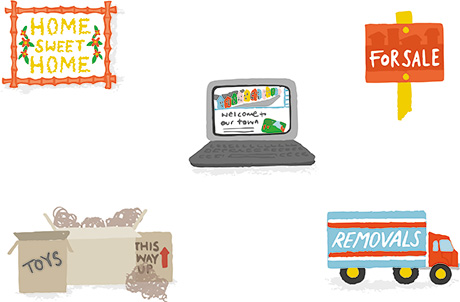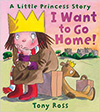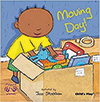
Download the PDF of this article
Moving home is frequently quoted as one of life’s most stressful events, even when it is a positive relocation, such as going to a nicer property. The upheaval is greater when you are doing it for negative reasons, such as family separation or financial problems, and more so if moving is a regular occurrence.
While you focus on the paperwork and other practical or emotional issues, try to keep in mind your child’s feelings and support them through the transition in order to lessen any distress that they may experience.
HOW TO PREPARE
It’s important to talk to your child, even toddlers, about major changes that are going to affect them, so that they have time to get used to the idea and ask any questions. So, talk about the planned move as soon as you can.
It can be useful to share bookswith young children about moving, especially if they have no previous experience of it, so that they can get an idea of what it may involve.
Talk about both the positive and negative changes – perhaps you’re moving away from the area, so your child won’t be able to attend the same nursery, but they will be able to see more of their cousins.
Answer any questions as honestly as you can. Be careful not to promise things that you can’t deliver – for example, don’t try to make your child excited about the move by saying that they can get a pet when that’s not allowed in the tenancy agreement.
If possible, take your child to the new home or areabefore you move so that they can start to picture what living there will be like. Support them to envisage their life there by showing them any nearby play park, swimming pool or the school or nursery they’ll be attending. If it’s not possible to visit, show them photographs or online resources to help familiarise them with their new home.
When it comes to packing, reassure your childthat their toys and treasured items are simply being put in boxes for the move and will be taken to their new home. You could encourage your child to help with the packing to include them in the process.
Discuss what will happen on the moving day – for example, that your child will go to nursery as normal or that they will be cared for by a family member then taken to the new home.
HOW YOUR CHILD MAY REACT
The impact of moving can be varied depending on a wide range of circumstances. Your child may be excited by the new place and take it in their stride, or they may be scared by the change and left feeling powerless because it’s something that they have had no control over. It’s normal for a child to experience:
- a feeling of sadness or loss because of leaving the safety of a familiar environment, friends or neighbours
- anger because they have no control over the move, which may result in tantrums, hitting or biting
- regression as they start sucking their thumb or bedwetting as they adjust to the unfamiliar surroundings
- anxiety or worry, perhaps displayed by being tearful or clingy, as they anticipate what their new home will be like, how they will make new friends or what a new school will be like
- a need for lots of cuddles and reassurance from you or other consistent people in their life.
Try to be calm and patient and let your child know that it is normal to feel worried, angry or anxious. These behaviours should reduce as they settle into their new home.
AFTER THE MOVE
- Reassure your child that while their home has changed, you’re still there for them.
- If possible, get your child’s bedroom sorted first with any special comforters and stick to familiar routines as much as possible so that they feel secure.
- Allow your child to ‘grieve’ and talk about the home or friends they have left behind.
- Introduce yourself to the neighbours and find out about groups or activities in the area that are appropriate for your child to enable them to start making new friends.
- If possible, invite old friends over to play, have a sleepover or video-call them so your child knows that they don’t have to break all ties with their former home.

STORY TIME
 A New Room for William by Sally Grindley
A New Room for William by Sally Grindley
William’s parents have separated and he has moved to a new home with his mum.
The House That Wanted a Family by Susan Spence Daniel
Told from the perspective of a house that’s for sale and waiting for a new family to love it.
 I Want To Go Home! by Tony Ross
I Want To Go Home! by Tony Ross
The Little Princess isn’t happy with her new castle and wants to go to her old one, only to find that new people live there.
Little Home Bird by Jo Empson
Little bird loves everything about his home so why should he move?
 Moving Day by Jess Stockham
Moving Day by Jess Stockham
A reassuring story about packing up and moving home.
My New Home by Marta Altes
Moving home can feel scary; little racoon discovers that wherever you go, adventures soon follow.









